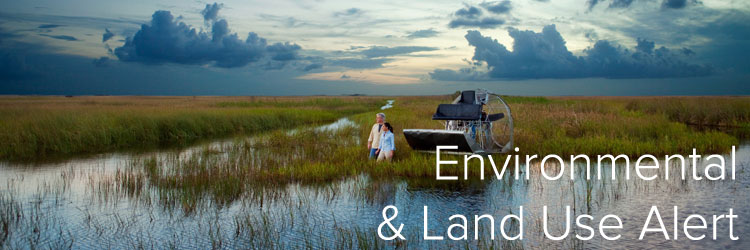
In response to two recent spills in Florida that simmered for days without notification to the public through the media, the Florida Department of Environmental Protection yesterday announced an immediately effective emergency rule requiring media notification of any incident resulting in pollution.
The emergency rule sweeps broadly, requiring “any owner or operator of any installation who has knowledge of any pollution at such installation [to] provide notice” within 24 hours “of any incident resulting in pollution or the discovery of pollution” to the DEP, the local government, and “the general public by providing notice to local broadcast television affiliates and a newspaper of general circulation.”
The emergency rule does not define “pollution” but presumably relies on the definition of pollution already in Florida law. “Pollution” is currently defined in Section 403.031(7), Fl. Stat., as “the presence in the outdoor atmosphere or waters of the state of any substances … in quantities or at levels which are or may be potentially harmful or injurious to human health or welfare, animal or plant life, or property which unreasonably interfere with the enjoyment of life or property, including outdoor recreation unless authorized by applicable law.”
Owners or operators whose pollution may affect or has affected areas beyond the property boundary have further notification obligations.
Information on the required contents of notices to the DEP and additional information about the rule can be found on the DEP’s website: www.dep.state.fl.us/pollutionnotice/ .
Significant questions remain about the application and scope of the emergency rule.
Emergency rules are effective for 90 days, although legal challenges or the need for legislative ratification of it can extend this period.
The DEP announced on its website that it will be undertaking a formal, nonemergency rulemaking process to “gather public input and make the rule change permanent.” The DEP’s website also relates that the governor will seek legislation to ensure the public is kept informed of incidents of pollution, that will put the public notification requirements into law, and increase the fine amounts and penalties for violators.
* * *
Greg Munson is the former general counsel and deputy secretary for water policy at the Florida Department of Environmental Protection. Since 2013, he has been a shareholder practicing environmental law and government affairs at Gunster, working in Tallahassee, Florida.
Yes! Please sign me up to receive email alerts from other Gunster practice areas.
This publication is for general information only. It is not legal advice, and legal counsel should be contacted before any action is taken that might be influenced by this publication.
About Gunster
Gunster, Florida’s law firm for business, provides full-service legal counsel to leading organizations and individuals from its 13 offices statewide. Established in 1925, the firm has expanded, diversified and evolved, but always with a singular focus: Florida and its clients’ stake in it. A magnet for business-savvy attorneys who embrace collaboration for the greatest advantage of clients, Gunster’s growth has not been at the expense of personalized service but because of it. The firm serves clients from its offices in Boca Raton, Fort Lauderdale, Jacksonville, Miami, Naples, Orlando, Palm Beach, Stuart, Tallahassee, Tampa Bayshore, Tampa Downtown, Vero Beach, and its headquarters in West Palm Beach. With more than 280 attorneys and consultants, and over 290 committed professional staff, Gunster is ranked among the National Law Journal’s list of the 500 largest law firms and has been recognized as one of the Top 100 Diverse Law Firms by Law360. More information about its practice areas, offices and insider’s view newsletters is available at www.gunster.com.
